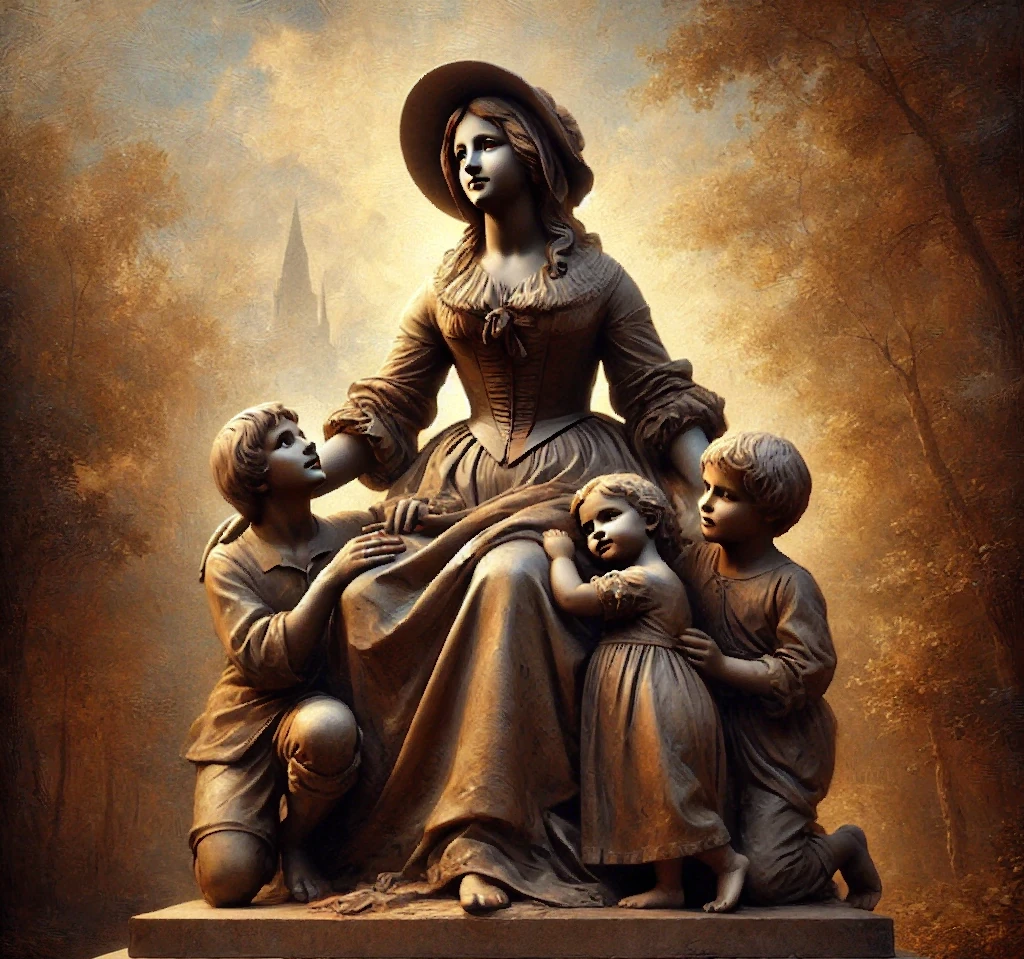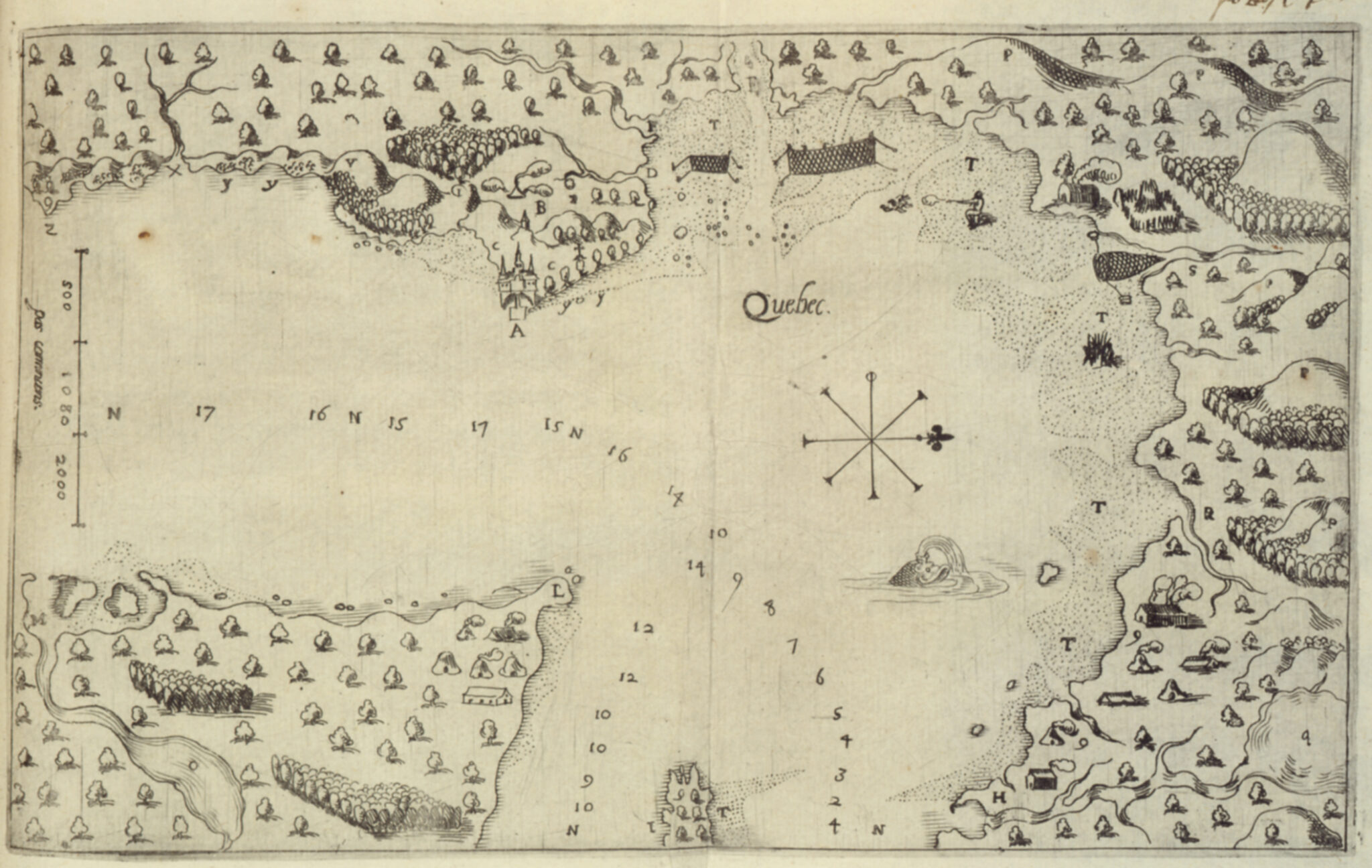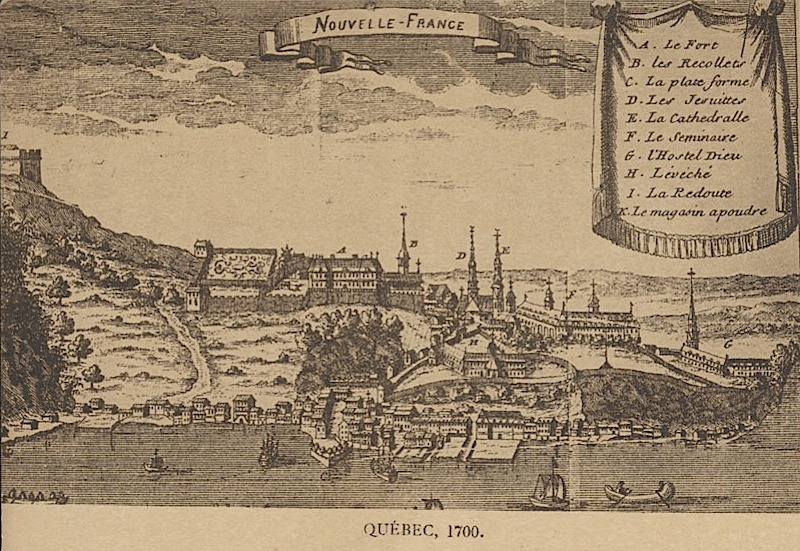
Marie Rollet
Marie Rolet aka Rollet, Roillet, Hébert, Hubou
Born about in St-Germain-des-Prés, Paris, Île-de-France, France
Daughter of Jean Rollet and Anne Cogu
Sister of Claude (Rolet) Rollet
- Married:
- François Dufeu — married before 1601 (to about 1601) [location unknown]
- Louis Hebert — married 19 Feb 1601 in Eglise Saint Sulpice, Paris, France
- Guillaume Huboult — married 16 May 1629 in Notre-Dame de la Recouvrance, Québec, Canada, Nouvelle-France Descendants
- Children:
Died: age 69 in Québec, Canada, Nouvelle-France
Marie Rolet (circa 1580 – 1649)
Marie Rolet was born around 1580 in Paris, France, to Jean Rollet, a royal cannoner, and Anne Cogu. She grew up in a well-off family and was educated, which was rare for women at the time. She married François Dufeu, but he passed away before she remarried. On February 19, 1601, at about 21 years old, she married Louis Hébert, a 36-year-old Parisian apothecary. They had three children: Anne, Guillemette, and Guillaume.
In August 1606, Marie sold their house in Paris for 2,160 livres to Queen Margaret of Valois. This gave the family financial stability. Louis Hébert had traveled to Acadia in 1606 and 1610, leaving Marie to manage the home and land.
Migration to New France:
In 1617, Marie, Louis, and their three children sailed from France to New France (modern-day Quebec). They traveled aboard the Saint-Étienne with Samuel de Champlain, Father Le Caron, and others. After a long and difficult journey, they arrived in Tadoussac in June 1617 and traveled by boat up to Quebec City, where they built a home with the help of Marie’s brother, Claude. By 1620, they constructed a stone house with help from workers at the Quebec settlement.

Marie and Louis worked together to clear the land, grow crops, and care for both French settlers and Indigenous people. Marie was also deeply involved in educating Indigenous children, particularly girls. She often acted as a godmother for the baptisms of Indigenous people who converted to Christianity.
Louis Hébert’s Death and Marie’s Third Marriage:
In 1627, Louis Hébert tragically died after falling on ice. After his death, Marie continued managing the family land and caring for her daughter and son-in-law, Guillemette and Guillaume Couillard.
On May 16, 1629, Marie remarried to Guillaume Hubou, a man around 24 years old. Despite the challenges they faced, Marie and her family stayed in Quebec during the English occupation by the Kirke brothers (1629-1632). They remained in the colony after the French returned, preserving relationships with the Indigenous peoples and continuing to care for Indigenous girls.
Marie’s house became a home for these girls, who were entrusted to the Jesuits for education. Marie also helped care for a young boy from Madagascar, named Olivier, who is thought to be the first black slave in New France.

Later Years and Death:
In 1637, Marie was a witness at the marriage of her daughter’s cousin, Marguerite Couillard, to Jean Nicolet. Over the years, she continued teaching, caring for the children in her care, and managing her land. She passed away on May 27, 1649, at the age of about 69 and was buried in Quebec City.
Legacy:
Marie Rolet is remembered as one of the first women to settle in New France and the first French female farmer. Her descendants are numerous in North America, particularly through her children Guillemette and Guillaume Hébert. Marie was a pioneer in “interculturalism,” as she taught Indigenous girls European education long before the term was widely known. A monument to her, Louis Hébert, and Guillaume Couillard was erected in 1917 in Parc Montmorency, Quebec.
Marie’s story was celebrated in 2017 for the 400th anniversary of her arrival in New France. Her legacy continues to be honored by her many descendants, who are recognized as key figures in the founding of Canada.
Further Research Resources:
What follows is a list of research resources for Marie Rollet (1580-1649). Since she’s a historical figure, you will need to look at a variety of sources, both primary and secondary. They are categorized below for easier navigation.
I. Primary Sources (Where possible, these are ideal):
- Notarial Records (Quebec): These are crucial. Marie Rollet’s life in Quebec would have been documented in notarial records: land transactions, marriage contracts, wills, etc. The Bibliothèque et Archives nationales du Québec (BAnQ) is the primary repository.1 You’ll likely need to search their online catalog and potentially consult with archivists. Be prepared for these documents to be in French and potentially difficult to read due to age and handwriting.
- Jesuit Relations: These are annual reports sent back to France by Jesuit missionaries in New France.2 They often mention important colonists and events.3 They are a valuable source for the early colonial period.4 Many have been translated into English. Look for mentions of Marie Rollet, her husband Louis Hébert, and their family.
- Early Quebec Census Records: If any exist for the period, these could provide demographic information about the family and their social standing.
- Legal Documents: Any court records, petitions, or other legal documents involving Marie Rollet or her family would be valuable. Again, the BAnQ is the place to start.
- Letters (if any): While less likely for someone of her social standing at that time, any surviving letters written by or to Marie Rollet would be invaluable.
II. Secondary Sources (These provide context and analysis):
- Biographies of Louis Hébert: Since Marie Rollet is often mentioned in connection with her husband, biographies of Louis Hébert are a good starting point. Look for scholarly biographies, not just popular accounts.
- Histories of New France/Quebec: General histories of the period will provide context for Marie Rollet’s life. Look for works by reputable historians. These will offer information about the social, economic, and political conditions of the time.
- Genealogical Research: Genealogical societies in Quebec and France may have information about the Rollet and Hébert families. This can help trace her ancestry and descendants.
- Academic Articles and Journals: Search scholarly databases like JSTOR, Project MUSE, and Érudit (a Canadian platform for humanities and social sciences research) for articles related to early Quebec, women in New France, or Marie Rollet specifically.5
- Books on Women in Colonial America/New France: These can provide insights into the roles and experiences of women like Marie Rollet.
- Local Historical Societies: Societies in the areas where she lived (France and Quebec) might have relevant publications or resources.
III. Online Resources (Use with caution; always verify information):
- BAnQ Website: This is essential for accessing notarial records and other primary sources.
- Library and Archives Canada Website: Another important resource for Canadian history.
- FamilySearch: A large genealogical database that might have information about the Rollet and Hébert families. However, always verify the information found here.
- Websites of Historical Societies: Many local historical societies have websites with articles, information, and links to other resources.6
- Wikipedia (Use with caution): Wikipedia can be a starting point, but always double-check the information against reliable primary and secondary sources.
IV. Research Strategies:
- Start with Secondary Sources: Get a good overview of the period and Marie Rollet’s life by reading some general histories and biographies.
- Move to Primary Sources: Once you have a good understanding of the context, start exploring the primary sources, especially the notarial records.
- Consult Archivists: Don’t hesitate to contact archivists at the BAnQ. They can be invaluable in helping you navigate the records and find relevant information.
- Be Persistent: Researching historical figures can be challenging. Be prepared to spend time searching and digging for information.
V. Key Search Terms:
- Marie Rollet
- Louis Hébert
- New France
- Quebec
- Notarial Records (Quebec)
- Jesuit Relations
- Colonization of Quebec
- Women in New France
Remember to critically evaluate all your sources and cite them properly.
Do you benefit from our articles and resources?
Your support, through donation or affiliate usage, allows ManyRoads to remain online.
